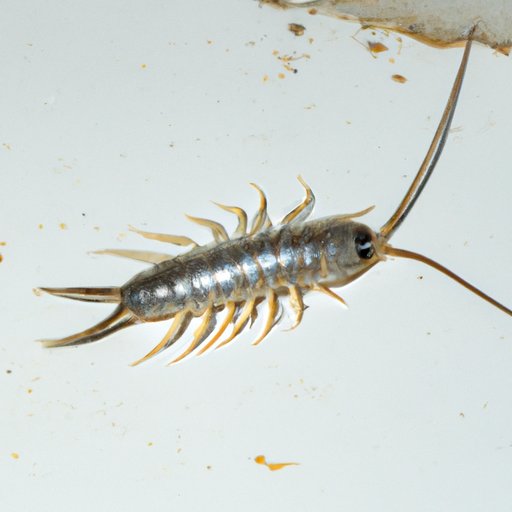I. Introduction
Silverfish are small, wingless insects that can be found in many homes. They are attracted to warm, humid environments and can feed on a variety of materials, including paper, cloth, and dead insects. Silverfish infestations are common, but fortunately, there are many steps homeowners can take to prevent and eradicate them. In this article, we will explore some natural remedies, cleanliness and organization tips, dehumidifiers, food storage, cleaning routines, insecticides, and hiring a professional pest control company that can help keep silverfish at bay.
II. Natural Remedies
One of the best ways to repel silverfish is by using natural remedies. Essential oils, such as lavender, peppermint, and tea tree oil, are effective in deterring silverfish. These oils are safe, non-toxic, and have a pleasant scent. You can add a few drops of essential oil to a spray bottle filled with water and spray it in areas where silverfish are commonly found, such as closets, bathrooms, and basements.
Diatomaceous earth is another natural remedy that can be used to repel silverfish. This fine powder is made from ground-up fossils and is safe for pets and humans. You can sprinkle diatomaceous earth in areas where silverfish are present, such as under sinks and in drawers. When silverfish come into contact with diatomaceous earth, the powder absorbs moisture from their bodies, causing them to die.
Vinegar is another natural remedy that can be used to repel silverfish. Simply mix equal parts of vinegar and water in a spray bottle and spray it in areas where silverfish are present. The strong odor of vinegar will deter silverfish from entering your home.
III. Cleanliness and Organization
Keeping your home tidy and organized is one of the most effective ways to prevent silverfish infestations. Silverfish are attracted to clutter and thrive in warm, humid environments. Keeping your home clean and organized will make it less appealing to silverfish and other pests.
Regular vacuuming and dusting can prevent silverfish from breeding in your home. Make sure to vacuum carpets, floors, and furniture regularly. Dusting surfaces such as bookshelves and window sills can eliminate potential hiding spots for silverfish.
Don’t forget about the importance of proper storage. Silverfish are attracted to food and paper products, so storing food in airtight containers and paper products in sealed plastic bags can prevent attracting them.
IV. Dehumidifiers
Using a dehumidifier is essential in areas that are prone to high humidity, such as bathrooms and basements. Silverfish thrive in humid environments, and using a dehumidifier can help reduce the moisture content in the air, making the environment less favorable to silverfish.
When choosing a dehumidifier, consider the size of the area you want to dehumidify. A portable dehumidifier may be sufficient for smaller spaces, while a whole-house dehumidifier may be necessary for larger homes. Make sure to choose a dehumidifier with a built-in hygrometer, which measures the humidity level in the air, and an automatic shutoff feature to prevent the dehumidifier from overflowing.
V. Store Food Properly
Silverfish are attracted to food and can feed on a variety of materials, including grains, cereal, and pasta. Proper food storage is essential in preventing silverfish infestations. Store food in airtight containers made of glass or plastic. Avoid storing food in paper or cardboard boxes, as they can easily be penetrated by silverfish.
Make sure to properly store all foods, including pet food, which can be particularly attractive to silverfish. Proper food storage can keep silverfish from entering your home in the first place.
VI. Cleaning Routine
Having a regular cleaning routine is essential in preventing silverfish infestations. Vacuuming floors and carpets, dusting surfaces, and wiping down counters and tables can remove food crumbs and other debris that may attract silverfish.
Make sure to pay attention to areas that are commonly overlooked, such as behind large appliances and under furniture. Regular cleaning can prevent silverfish from breeding in your home and becoming a larger problem in the future.
VII. Insecticides
Insecticides should be used as a last resort when natural remedies and cleaning routines fail. There are many insecticides available that can be used to kill silverfish, but it’s important to choose a safe and effective option.
Boric acid is a popular and effective insecticide that is safe for pets and humans. You can sprinkle boric acid in areas where silverfish are present, such as under sinks and in drawers. When silverfish come into contact with boric acid, the powder sticks to their bodies and is ingested when they groom themselves, causing them to die.
Other effective insecticides include pyrethrin, cypermethrin, and deltamethrin. These insecticides should be used according to the manufacturer’s instructions and should never be used in areas where food is present.
VIII. Hiring a Professional
If you are experiencing a particularly difficult silverfish infestation, it may be necessary to hire a professional pest control company. Pest control professionals have access to stronger insecticides and can offer advice on how to prevent silverfish infestations in the future.
When choosing a pest control company, make sure to choose a reputable and licensed company. Ask for recommendations from friends and family and read online reviews. Make sure to ask about the cost of services and what they entail.
IX. Conclusion
Silverfish infestations can be a nuisance, but they can be prevented and eradicated through the use of natural remedies, cleanliness and organization, dehumidifiers, proper food storage, regular cleaning routines, insecticides, and the use of professional pest control services.
By following these tips and best practices, homeowners can keep their homes silverfish-free and enjoy a clean, pest-free living space.
